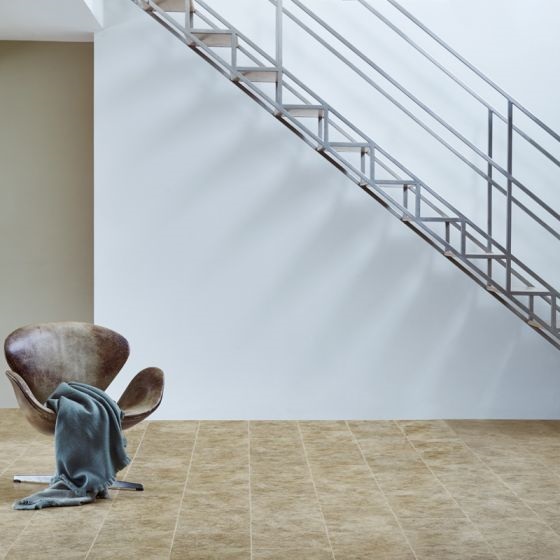Vinyl plank flooring is a popular choice for staircases due to its cost-effectiveness, beauty, and easy maintenance. If you’re thinking of installing it, it’s important to consider various factors that will affect the overall cost. This article will guide you through the prices, sizes, and labor costs associated with vinyl plank flooring, helping you to effectively budget for your home improvement project.

Cost to Install Vinyl Tile Flooring
Vinyl plank flooring typically falls within the price range of $2 to $7 per square foot, averaging around $4.50. To estimate the total cost of your project, consider the amount of square footage required. For instance:
- For 100 square feet, costs range from $250 to $1,300.
- For 200 square feet, you’re looking at $500 to $2,600.
- For 300 square feet, the cost ranges from $750 to $3,900.
Major Cost Factors of Vinyl Plank Flooring Installation
- Type of Vinyl Plank Flooring
The market offers various types of vinyl flooring to cater to different needs and preferences. Vinyl sheets, which are large and relatively thin pieces, offer high water resistance, making them ideal for moisture-rich environments such as kitchens. Standard vinyl, available in smaller planks or tiles, is designed to replicate the appearance of natural wood or stone. Luxury vinyl planks (LVP) or tiles (LVT) share a similar shape with standard vinyl but boast higher quality. They not only more closely mimic the look of natural materials but also offer greater durability and water resistance compared to their standard counterparts. The typical price ranges for these vinyl flooring options are as follows:
-
- Vinyl sheets: $1.50 per square foot
- Standard vinyl planks: $4.50 per square foot
- Luxury vinyl planks and tiles: $6.00 and above per square foot
- Cost by Vinyl Plank Size (Thickness, Width, Length)
The composition of vinyl planks greatly influences their pricing. Each plank comprises several layers: the underlayment, which adds cushioning and enhances water resistance; the core, containing both the vinyl structure and the design; and the wear layers, designed to fend off scuffs, scratches, and stains.
Vinyl plank thickness varies from 2 to 8 mm, with thickness often indicating both the quality and the cost. Thinner vinyl planks, which are generally cheaper, may wear out more quickly due to a thinner top layer, or they may lack an underlayment, resulting in a harder feel underfoot. As a general guideline, thicker planks signify a higher investment. Additionally, planks that are both wider and longer tend to be priced higher.
- Cost by Core and Finish
When planning your budget, the core type of your vinyl flooring also plays a significant role. Rigid core planks, known for their durability and hardness, are suitable for high-traffic areas such as entryways. Conversely, vinyl options with a wood base, like wood-plastic or wood-polymer composites, offer a softer feel underfoot, making them ideal for kitchens and living rooms. However, these wood-based varieties typically come at a higher price.
Furthermore, the finish on your vinyl flooring significantly impacts the cost. Less expensive vinyl planks feature a visual design printed directly onto the topcoat and range from $1 to $5 per square foot. These options are generally less durable, showing wear like scratches and scuffs more readily over time. On the luxury end, more costly vinyl planks have a 3D image embedded beneath the topcoat. This not only yields a more realistic appearance but also enhances durability. Such luxury vinyl planks start at around $6 per square foot.
- Cost by Shape of Room
The time invested and the materials used for your project will have a direct influence on your overall budget. Naturally, larger areas necessitate more flooring material compared to smaller spaces. If you are dealing with an irregularly shaped room, the complexity of the installation process escalates due to the necessity to measure, cut, and potentially discard excess materials.
When it comes to staircases, the shape significantly impacts the ease of installation. Straight, rectangular-shaped stairs are less complicated to fit with vinyl planks, while installing them on curved staircases presents challenges with custom cuts and fittings, especially around landings.
- Labor Cost
Vinyl stands out as one of the most accessible flooring options for DIY enthusiasts. Many homeowners find they’re able to install vinyl flooring independently, avoiding the expense of hiring a contractor. For those embarking on a DIY project, peel-and-stick vinyl tiles are recommended for their ease of installation.
However, if you opt to hire a contractor, installation costs can range from $1 to $6 per square foot, varying with the quality of the materials used. For example, installing luxury vinyl plank flooring might escalate the cost to around $10 per square foot.
It’s also important to consider the specific needs of installing vinyl on staircases. This might involve additional preparatory work such as removing existing flooring, repairing or leveling stair treads, or maintenance on the stair structure itself, all of which can increase the total cost of your project.
